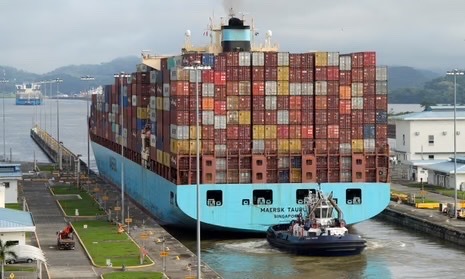Why Donald Trump Cares About the Panama Canal Now
The Panama Canal, a key link in global trade, has been a point of strategic importance for over a century. Built by the United States and controlled by it until 1999, the canal connects the Atlantic and Pacific Oceans, reducing shipping times and costs. Today, the canal remains critical to global commerce, but former President Donald Trump has expressed concerns about a new threat: China’s influence over the ports that bookend this vital waterway.
A Brief History of the Canal
The Panama Canal was constructed by the U.S. between 1904 and 1914, at a cost of $375 million (equivalent to over $8 billion today). While the canal was profitable, the direct financial returns never fully recovered the investment. Its strategic value, however, was immense, allowing the U.S. military and commercial ships to move quickly between oceans.
In 1977, President Jimmy Carter signed the Torrijos-Carter Treaties, which transferred control of the canal to Panama by 1999. This handover fulfilled a promise to respect Panamanian sovereignty, and since then, the Panama Canal Authority (ACP) has successfully managed the canal, generating billions in revenue for Panama’s economy.
The Ports and Hutchison’s Role
While Panama manages the canal, the Ports of Balboa (Pacific side) and Cristóbal (Atlantic side), which handle much of the canal’s shipping traffic, are operated by Hutchison Ports PPC. Hutchison is a subsidiary of CK Hutchison Holdings, a Hong Kong-based company originally founded in the 19th century as a British trading firm. In the 1970s, the company was acquired by Hong Kong billionaire Li Ka-Shing, who expanded its global operations.
Today, Hutchison Ports operates 53 ports in 24 countries, making it one of the largest port operators in the world. While it began as a British company, its modern headquarters in Hong Kong and the increasing influence of the Chinese government over Hong Kong raise concerns about Beijing’s potential control over strategic infrastructure like Panama’s ports.
Why China’s Involvement Matters
Since the 1997 handover of Hong Kong to China, Beijing has steadily increased its influence over the region, especially after implementing the National Security Law in 2020. This has led to fears that companies like Hutchison Ports, while nominally independent, could be pressured by the Chinese government to serve its geopolitical interests.
Ports are not just logistical hubs; they are critical for managing global trade. Controlling port operations near the Panama Canal could give China the ability to monitor or disrupt shipping in the event of a geopolitical conflict. While there’s no evidence that this has happened, the potential risk alarms policymakers in Washington.
Trump’s Concerns About Panama
Donald Trump has repeatedly raised the issue of China’s growing influence near the Panama Canal, even suggesting that the U.S. might need to “take back” the canal. His concerns stem from the canal’s importance as a chokepoint for global trade and the fear that China’s presence could undermine U.S. security and economic interests.
While such rhetoric appeals to those wary of China, the reality is more complicated. Reclaiming the canal would violate the Torrijos-Carter Treaties and damage U.S.-Panama relations. Moreover, Panama has operated the canal efficiently and fairly since taking control, maintaining its neutrality and accessibility to all nations.
Panama’s Position in the Geopolitical Struggle
It’s important to note that Panama is not to blame for the current situation. The country awarded the port concessions to Hutchison in 1997, before China’s influence over Hong Kong became a major concern. Since then, Panama has modernized and expanded the canal, even completing a $5.25 billion expansion project in 2016 to accommodate larger ships. The canal now generates billions annually and contributes significantly to Panama’s economy.
Panama continues to manage the canal responsibly, adhering to its commitments under the Neutrality Treaty, which ensures the waterway remains open to all nations. However, its reliance on foreign operators like Hutchison for port management leaves it caught in the middle of the U.S.-China rivalry.
The Broader Implications for Global Trade
Trump’s concerns highlight the broader issue of China’s global ambitions. Through its Belt and Road Initiative, China has invested in ports and infrastructure worldwide, increasing its influence over key trade routes. While Panama’s ports are just one piece of this puzzle, their proximity to the canal magnifies their strategic importance.
The challenge for the U.S. is to counter China’s influence without undermining Panama’s sovereignty or the canal’s neutrality. Strengthening diplomatic ties with Panama and offering economic incentives to diversify its partnerships may be a more effective approach than escalating tensions.
Conclusion: A Canal in the Crosshairs
The Panama Canal remains a vital link in global trade, and its surrounding infrastructure has become a focal point in the growing rivalry between the U.S. and China. While Donald Trump’s concerns about Chinese influence are not unfounded, addressing them requires a careful balance of diplomacy, economic engagement, and respect for Panama’s sovereignty. In this new era of geopolitics, securing the future of the canal will depend on collaboration, not confrontation.


















